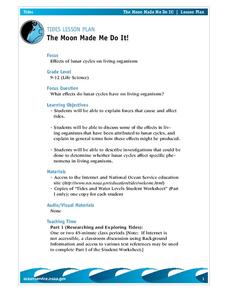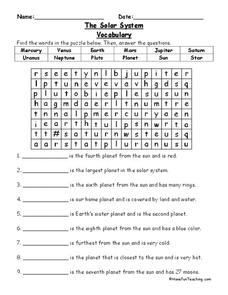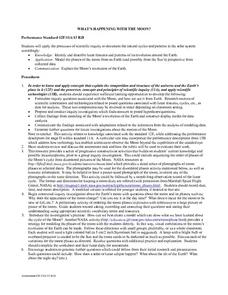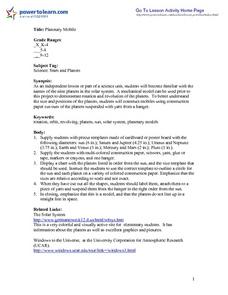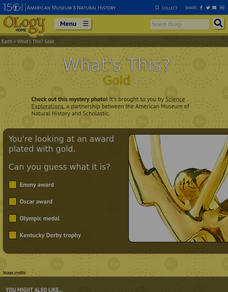Curated OER
Exploring Meteorite Mysteries: Building Blocks of Planets
Students simulate the formation of chondrites and asteroids. In this astronomy lesson plan, students demonstrate accretion using balloons and static electricity. They compare and contrast their models to the actual process of chondrites...
Curated OER
Using Bloom's Taxonomy in Science
Help your students internalize knowledge by creating activities that utilize higher level thinking skills.
Curated OER
The Moon Made Me Do It!
Students research about how lunar cycles affect living organisms. In this biology lesson, students prepare an oral presentation of their research results and analyses. They explore the forces that affect tides.
Curated OER
Explore Efficient Energy Uses
In this energy worksheet, learners explore different ways to conserve energy. They write a short description for each of the 10 methods presented.
Curated OER
Compass Rose
Students describe the movement of the Earth as it relates to the sun. They construct a permanent compass rose and use it to find directions.
Curated OER
Phases of the Moon
Students answer the question, "How are the motions of the Earth, the moon, and the sun, related to the moon's phases?" They observe the moon to create a moon journal and a phases of the moon diagram.
Curated OER
Types of Tides
In this tides learning exercise, learners are given different diagrams of the sun, moon and earth in relation to each other. Students determine the type of tides created in each diagram and identify the phase of the moon.
Curated OER
Water Cycle: Social Studies Online
If you need a presentation that describes the 3 elements of the water cycle then this PowerPoint could be a good starting point. This resource is basic in its presentation and formating, and only defines the words evaporation,...
Curated OER
Inner Planet Properties
In this planets worksheet, students complete a graphic organizer by determining their weight on that planet, its distance from the sun, the days it would take to travel from the Earth, and any other special features.
Virginia Department of Education
Weather Patterns and Seasonal Changes
Get your class outside to observe their surroundings with a lesson highlighting weather patterns and seasonal changes. First, learners take a weather walk to survey how the weather affects animals, people, plants, and trees during...
Virginia Department of Education
Solar System Model
How many planets can you name? Did you get all 13 in our solar system, including the dwarf planets, or were you surprised when you read there are 13 planets? The lesson helps scholars understand the scale of the universe including the...
Curated OER
The Solar System
In these space science worksheets, students find the words in the word search puzzle. Students then answer the nine questions about the planets.
Virginia Department of Education
Planet Line-Ups
Should Pluto be considered a planet or a dwarf planet? Scholars research planets in our solar system to understand their similarities and differences. It also includes memory activities related to the order of the planets.
Curated OER
The Solar System
In this science worksheet, young scholars learn the names of the 9 planets in our solar system (Pluto is still included here) and locate them in a word search. Students answer 9 questions about the planets--their positions and attributes.
Curated OER
Day and Night
In this day night compare and contrast worksheet, students examine a picture of the earth and of the sun labeling day, night, equator, sun, North Pole, and South Pole.
Curated OER
Scale Model of the Solar System
Students explore the size of the planets. In this science lesson, students create a scale model of the solar system. Students determine a scaling factor and calculate the size of their planets. Students create a scale drawing of the...
Curated OER
What's Happening With the Moon?
Young scholars review the process of scientific inquiry. Using this information, they identify the patterns and cycles of the moon as it revolves around the Earth. In groups, they model the phases of the moon from the Earth and Sun's...
Curated OER
Planetary Mobile
Students receive pre-cut templates of cardboard with appropriate diameters of each planet and the sun. They use multi-colored construction paper, scissors, yarn, and other art supplies to create their own models of planets. When students...
Curated OER
The Planets in Our Solar System
Students gain knowledge about earth and space science by studying the nine planets in the solar system as well as their key characteristics. In this solar system lesson, students identify the nine planets. Students work in groups to...
Curated OER
Galaxies and the Universe
If Earth was formed 4600 million years ago, and the sun revolves about the center of the Milky Way once every 250 million years, how many revolutions have occurred? Learners answer this question and ten more, all providing students with...
Curated OER
The Air Around You
For this air worksheet, students will answer questions about the Earth's atmosphere, including the layers, air masses, and heat transfer. Students will explore how the difference in atmospheric temperature can create weather patterns....
American Museum of Natural History
What's This? Gold
Cell phones are likely made of gold—at least part of them! An interesting lesson explains the conventional and not-so-conventional uses of the popular element gold. From the Inca empire to modern-day technology, learners discover gold...
Curated OER
Influential Scientists Crossword Puzzle Worksheet
In this influential scientists crossword activity, students read 12 clues pertaining to science professionals. Students fit their answers in a crossword puzzle.
Curated OER
Movement of Air II
In this movement of air instructional activity, students determine the deflection of air masses that result from Earth's eastward rotation. Then they describe what winds provide for different trades. Students also identify and describe...




